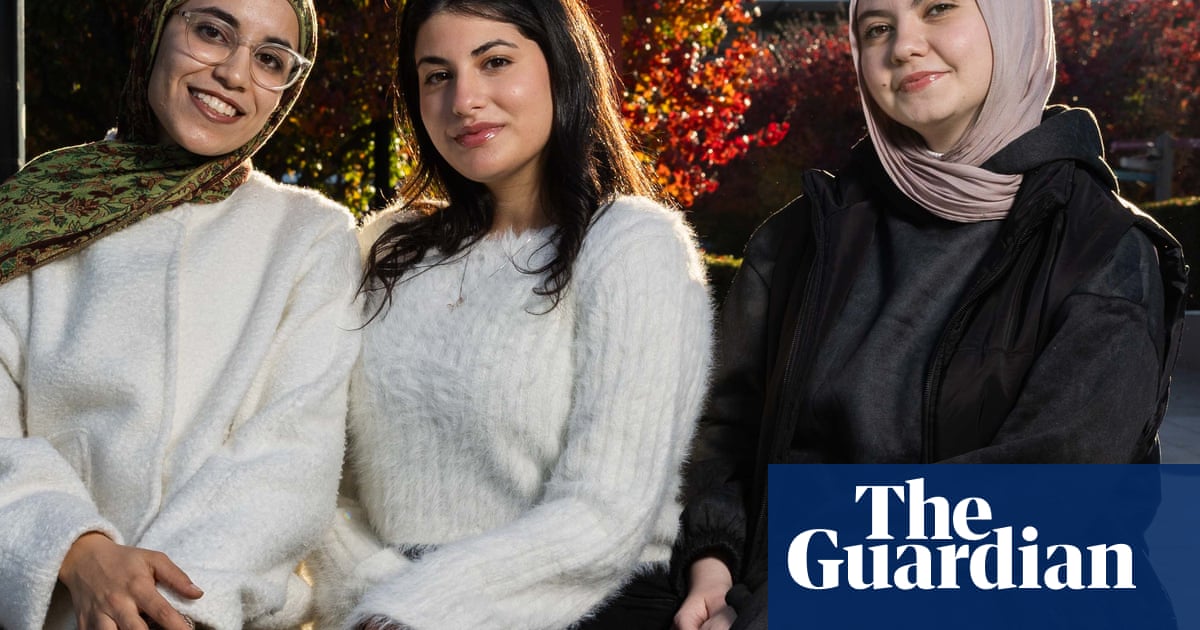Weeks after 7 October 2023, Hala Alsammakstood at the site of her once bustling university inGaza. Al-Azhar university had been reduced to rubble.
Alsammak had begun studying there after graduating from the Holy Family School in 2022, where her father had taught biology for more than two decades.
After the Hamas attack on Israel, and the Israeli invasion of Gaza, the school became a place of shelter for hundreds of displaced people. Then, in July last year, it was bombed, killing four.
“When the war came, everything stopped,” Alsammak says.
Sign up for Guardian Australia’s breaking news email
“There’s something called a green area – related to government or educational places like universities.” She says in previous conflicts, Israel didn’t target them.
“But from the first week [after 7 October], they started bombing all the public facilities,” she says.
Two years on, she’s found herself reconnecting with former high school classmates in a place they had never expected to visit:Sydney.
Western Sydney University (WSU) established a program for people fleeing conflict last year in response to global conflict in Palestine, Lebanon and Ukraine.
Now 20, Alsammak didn’t even know her friends Tala Hakoura, 20, and Hala Idrees, 18, were living in Australia until they found themselves in the same English class at WSU.
“I said ‘Hala, what are you doing here!’” Hakoura – who was taught by Alsammak’s father back in Gaza – laughs.
The trio are among 35 Palestinian refugees who have joined the program, which offers a direct pathway to undergraduate degrees.
A number of Australian universities including Flinders, the Australian Catholic University and Queensland University have established scholarships or doubled their efforts to support refugees following the war in Gaza.
The UNIndependent International Commission of Inquiry on the Occupied Palestinian Territory estimated earlier this month that more than 90% of the school and university buildings in Gaza have been destroyed and more than 658,000 children in Gaza have had no schooling for 20 months.
A few months after the conflict began, Alsammak was among those required to evacuate.
“For us, and all the wars before us, my dad would say, ‘we want to die together and in our home, to die in the same place together’,” Alsammak says. “The decision to evacuate our home was the most difficult decision in our whole lives.
“We didn’t take anything, we were thinking we will come back, and two weeks after that, [the Israel Defense Forces] destroyed the whole area … and when you leave, you aren’t able to go and look back.”
Alsammak arrived in Australia with her parents and sisters a year ago, after seven months in limbo in Egypt.
“We didn’t know anything,” she says. We didn’t know the shops around us, the transport, we had to figure it all out alone. Then every time I went to universities [in Australia] they told me ‘no, we can’t help you’.”
She says the call to WSU was her “last chance”.
Alsammak and her peers will complete their English course next week, paving the way to begin undergraduate degrees in July.
It’s been a particularly hard road for Idrees, whose year 12 studies were cut short by the war. She somehow managed to complete her education online from the West Bank after her school was bombed.
Sign up toBreaking News Australia
Get the most important news as it breaks
after newsletter promotion
“I was the only one studying, completely alone,” she says.
After arriving in Australia six months ago, she was referred to the WSU program on a community WhatsApp group, and encouraged by her family to apply.
It’s a similar story for Hakoura, who has been in Australia for a year without her mother and 17-year-old sister, who remain in Gaza.
She says two years without studyinghas fractured her ability to focus. So, too, has watching and waiting for the war to end.
“Even now, I find it hard to study for an hour,” she says. “But I promised my mum and sister – ‘I’ll make you proud of me, and I will study my best to get high marks’.”
The vice-chancellor of WSU, Prof George Williams, says for many of his students, the war in Gaza is very personal. There have been pro-Palestine protests at the campus, like others that havespread across Australia’s universities.
“There’s been very high levels of distress, many have lost family members and loved ones,” Williams says.
“We felt we had to do more. The local community was telling us ‘what can you do?’, and we responded … because you have to give people hope and a sense you can make a difference.
“You can’t change geopolitics but you can give people an education.”
WSU educates 170 different ethnic groups.Two in three of its studentsare the first in their family to go to university, and half speaka language other than English at home.
On Wednesday, WSU rankedfirst in the worldin the Times Higher Education community impact rankings, which measures social and global impact – including addressing inequity – for the fourth year running.
Next semester, Idrees wants to study medical science and eventually become a doctor. Hakoura is considering business or occupational therapy. Alsammak wants to do music therapy or psychology, after her experience working with children caught up in the conflict in Gaza.
“For me, I always come back and tell myself, Hala, if anyone came to you [before the war] and said ‘you will be in Australia in two years’ I wouldn’t believe that,” she says.
“No, everything can be possible in this life.”
